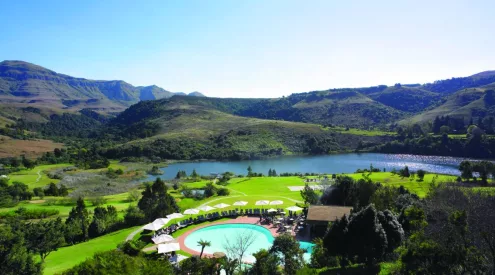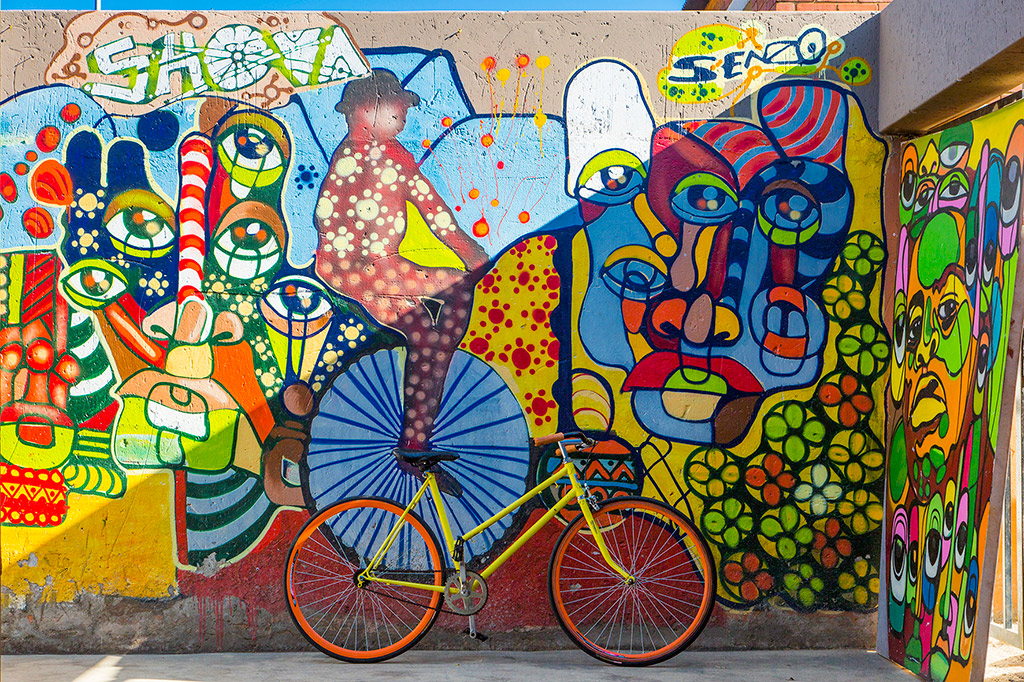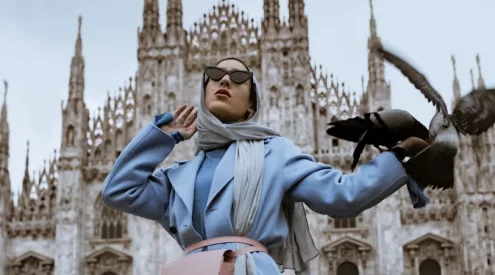In this inside guide, Niq Mhlongo, a writer born and bred in Soweto, takes us through his hometown and insists that people who only go to Vilakazi Street and think they know Soweto, are like people who only read the blurb of a novel and think they know the whole story. Photos by Teagan Cunniffe.
Catch Niq Mhlongo at the at Abantu Book Festival hosted in Soweto this December.
The 49 steps of the Oppenheimer Tower in Central Jabavu lead the three of us to the allure of Soweto township. It’s an easy, free-of-charge, winding climb for Lebo, Marhule and I, and the promise of the 180-degree view of Soweto outweighs the sad history of apartheid that residents endured in the past.
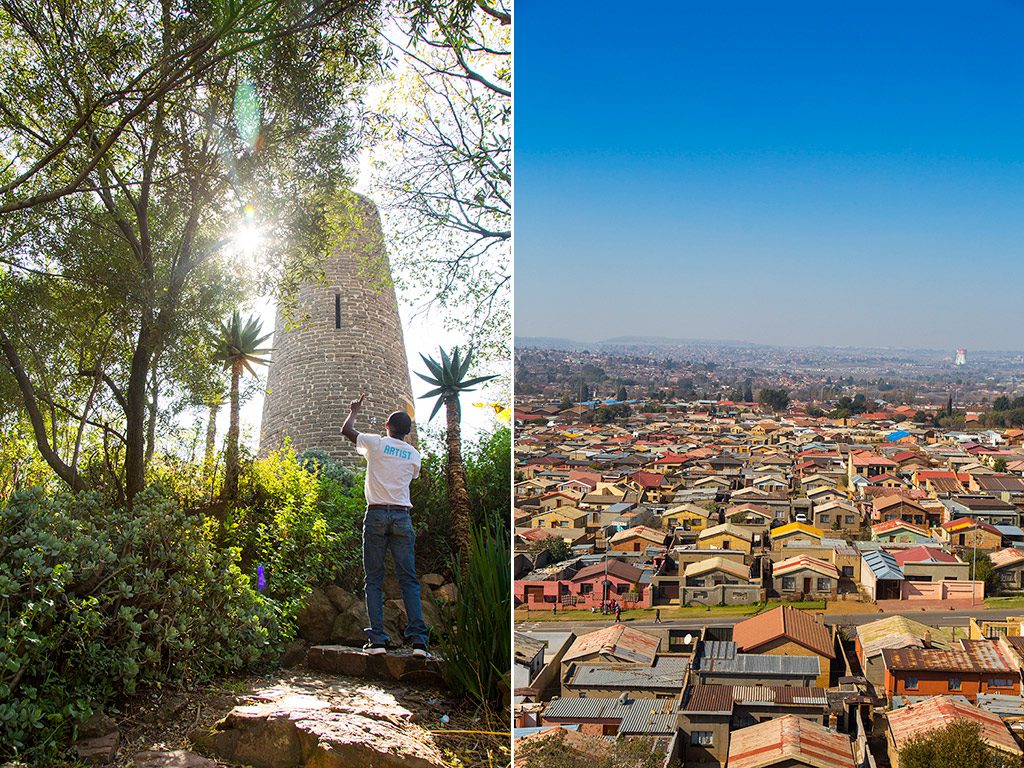
LEFT: Lebo Sello, the guide, in the garden at the bottom of the Oppenheimer Tower. RIGHT: The view from the top of the Oppenheimer tower.
This morning our visit coincides with the 40th anniversary of 16 June 1976, and Lebo Sello is our guide from Credo Mutwa Cultural Village where the tower is. Youth Day public holiday is often a big celebration in Soweto; young and old people wear school uniforms to commemorate the student uprising. But today seems like any ordinary day, except that President Zuma will be speaking at nearby Orlando Stadium at noon. Mputhi Street and the Morris Isaacson High School are fairly quiet, except for the hawkers who are peddling popular house music CDs and loose cigarettes to motorists.
It’s not the first time I climb these stairs, but for my childhood friend Marhule it is. We are both from Chiawelo, which is seven minutes’ drive from here. Halfway up, Lebo pauses with one hand on the rail. He turns his head and smiles down at us, pointing at a nest. ‘That’s the baby red-eye dove. Please mind your steps. Her mother is out.’ I’m tempted to ask a question about the baby dove, but I keep quiet as Lebo continues to tell us his version of Soweto history. ‘Just like the USA consists of 50 states, Soweto used to have 49 sections before the new areas like Bram Fischer and Glen Ridge were born.’
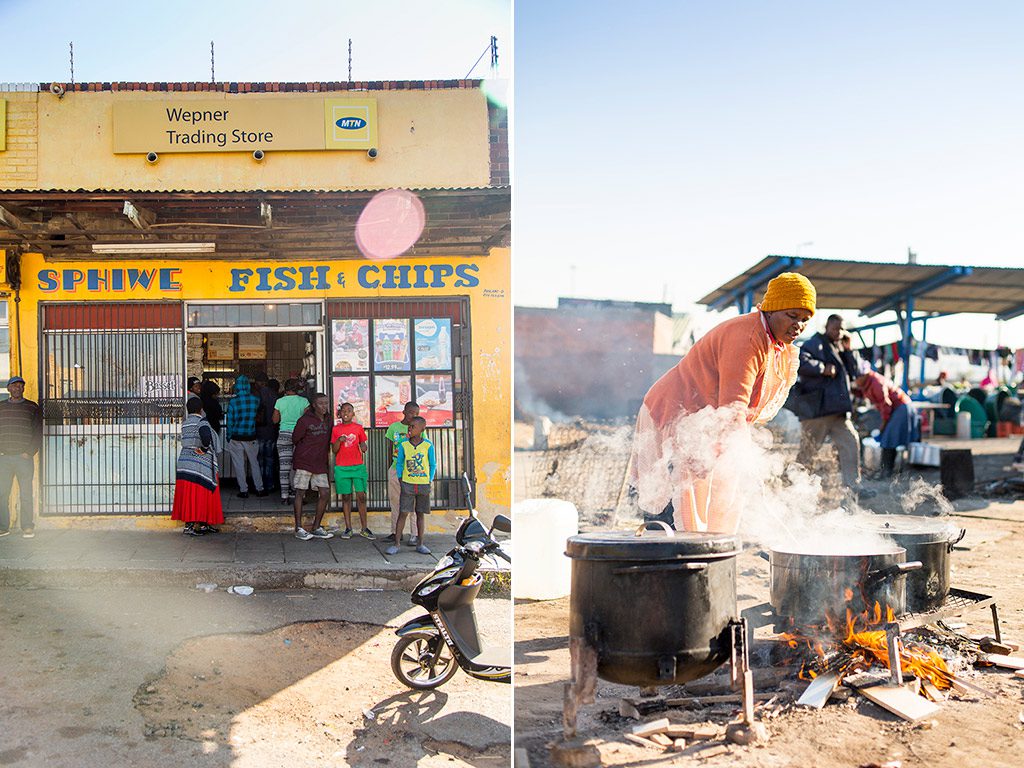
LEFT: Fish and chips store by the road. RIGHT: Cooking street food.
I was not aware that the steps we’re climbing represent the 49 different sections of Soweto, but I nod as if this is not news to me. Upon landing on the open 49th step, the cold morning air seems to hold the subtle smell of the township – a combination of coal stoves, car exhausts, vetkoeks, atchar, Vienna and Russian sausages. Overhead, scattered clouds are wheeling up into the sky. The sound and sight of the passenger train far below take me down memory lane, when Marhule and I were growing up.
I’m reminded of the swimming pool we used to visit in Senaoane in the mid-1980s. At that time, each section of Soweto was divided along ethnic lines. Since the swimming pool was in Senaoane, it meant that people from other areas – like Vendas and Shangaans from Chiawelo – were bullied. There is one incident I can still remember as clearly as if it were a reel of cinema film. While we were swimming, some boys took our clothes and walked away. We couldn’t go home naked, so we improvised by making plastic bags our makeshift clothes.
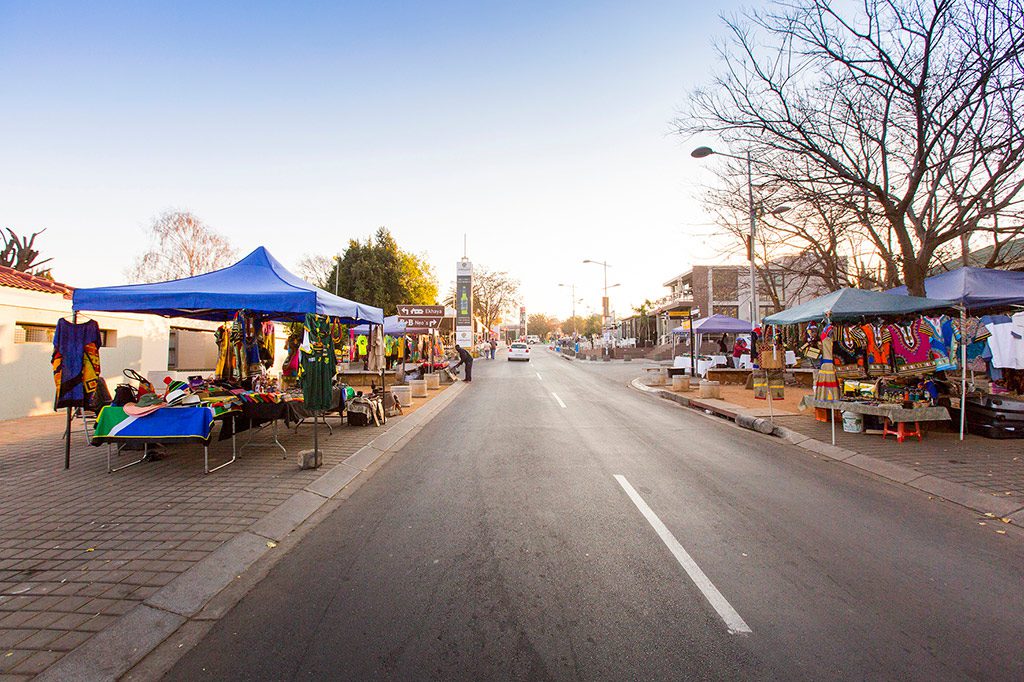
A view of the popular Vilakazi Street.
That was then. It’s understandable why in the past, the name Soweto conjured up images of squalor, squatter camps, dusty roads, black smoke, crime, meanness, poverty, apartheid and ugliness. Soweto has changed, I think as I look at the red structure of the recently built Soweto Theatre nearby. The township commands a new level of respect, benefiting from its ubuntu tendencies that visitors revere. Not so long ago, the Jabulani Amphitheatre next to the theatre was the main attraction in Soweto. Today, there are so many things to do other than going to the pool in Senaoane or waiting for the annual Godfrey Moloi Goodwill Games – a soccer tournament – in Mapetla. There are places like the Orlando Towers, Hector Pieterson Memorial, June 16 Soweto Student Trail, Tutu’s House, Mandela’s House, Freedom Square, and so on.
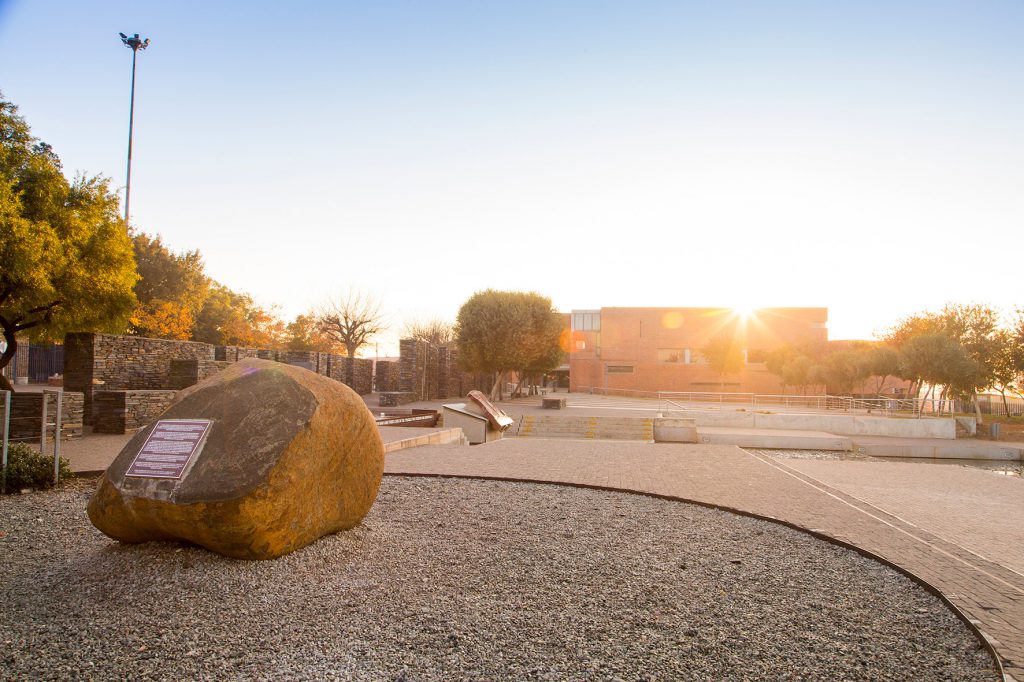
The Hector Pieterson Memorial.
We descend the steps and Lebo leads us to the Credo Mutwa Cultural Village. Here we learn about African traditional systems and practices as envisaged by the creator of the village and sculpture garden, ubaba Credo Mutwa, author of the classic Indaba, My Children and a High Sanusi (a top-level sangoma). The experience of being in the village within the township brings peace to my soul, and I feel completely healed – as if I was wounded before. We give Lebo a R50 tip for the great Soweto lesson before joining Mputhi Street to the far west end of Soweto. e’SociaLink is a new place that has just opened along the R558.
It is popular for its reasonable prices, open space, cleanliness, huge parking lot and great music. We are greeted by the aroma of grilling meat that comes wafting out of the braai place, and a DJ playing great old R&B songs. It’s already two in the afternoon and we are hungry and thirsty. We buy six chicken wings and lamb chops for R120, which includes the pap and chakalaka. We also buy six Long Tom cans of Castle Lite for R120, which come in an ice bucket.
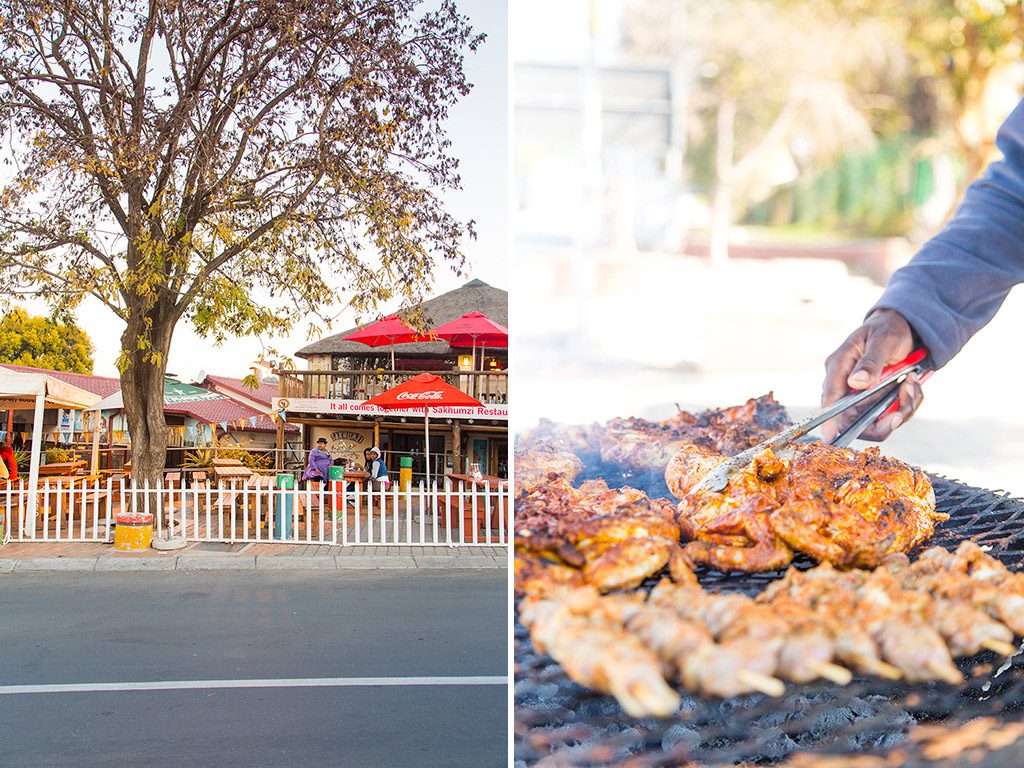
RIGHT: At the e’ SociaLink RIGHT: Braai stands are ubiquitous in the township’s streets.
The following morning Marhule and I decide to explore other parts of Soweto, and start with Chaf-Pozi in Orlando East. It is noon, but already the place is packed. Every now and then buses arrive with tourists who take pictures of the colourful cooling towers and bungee jumpers. Up on top of the 33-storey towers, a few people are enjoying the panoramic views of Soweto. About five young white women are climbing the towers using ropes, and it seems they’re competing as people are cheering them on. Huge speakers blast loud house while some people dance on the lawn. There is a great aroma by the braai stand at the entrance, and some quad-bikers are making a grand entry outside at the parking lot. We buy two Castle Lite dumpies (R20 each) at the bar, and soon our eyes are searching the crowded scene for familiar faces.
Our next stop is Ubuntu Kraal in Orlando West, where the launch yesterday of a new beer called 76 Jameson coincided with the June 16 celebrations. This is the home of Soweto Gold Beer, which comes in six variations – Apple Ale, Cherry, Gogo’s Ginger, Orlando Stout, the 76 Jameson and Superior Lager, which was my favourite (they’re all good, but some tasted more like cider to me).
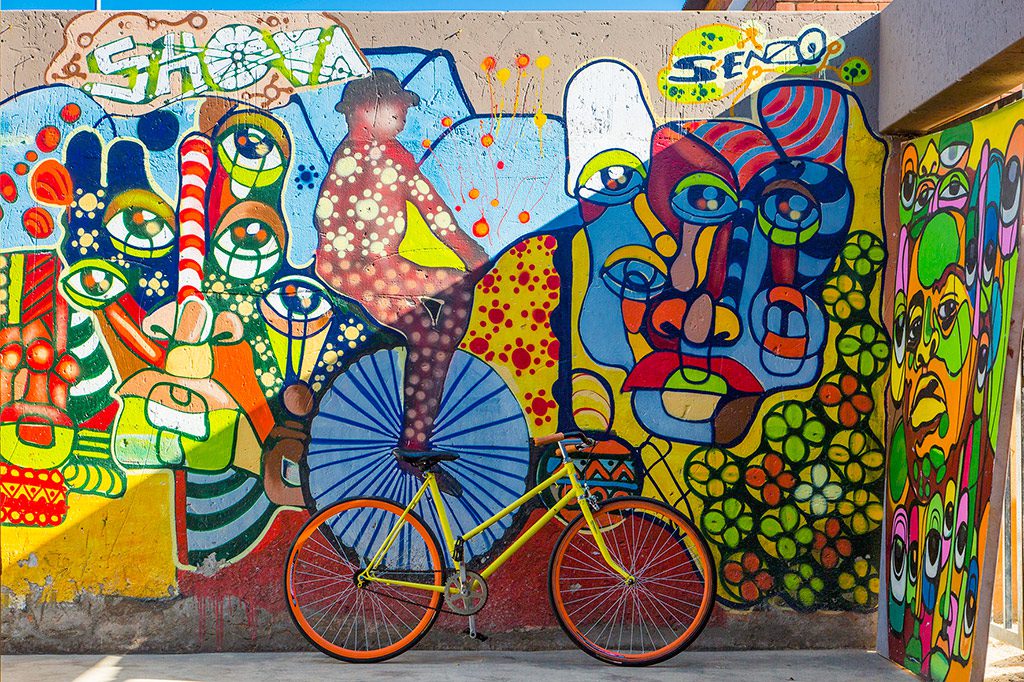
Street art in Soweto.
Our last stop is Sakhumzi Restaurant in Vilakazi Street, the busy, touristy part of Soweto. Besides the appetising buffet, Sakhumzi has great live traditional shows (Ladysmith Black Mambazo has performed here), and we are entertained until about 10 in the evening. Just like in the past, the present tales of Soweto are likely to draw people like a magnet. To me Soweto is like that beautifully written novel with a great plot sitting on your bookshelf, waiting to be read and enjoyed. Those who have walked its exotic streets and seen new or different things will tell you how modern and sophisticated this place is. As a Sowetan, I feel that those people who only go to Vilakazi Street and think they’ve explored the place are like those who only read the blurb of a novel and think they know the whole story.
Plan your trip
Getting there
The distance from Johannesburg CBD and Soweto is roughly 30 kilometres. The easiest way is to take the M1 South until you off-ramp at the Soweto Highway. Drive until the circle into Klipspruit Valley Road, where you turn left. This leads to Kumalo Main Road (for Hector Pietersen Memorial). From there you can head for Vilakazi Street (Mandela and Tutu Houses), or Mtipa Street, taking a left into Senokoanyana Street (for Ubuntu Kraal).
Need to know
Most parts of Soweto are safe and security officers patrol parking lots. You do not have to carry large amounts of cash on you as most places have speed points for transactions. On the last Thursday of every month Shova Lifestyle hosts a night market with music, food and art along Vilakazi Street. 0736353678, find them on Facebook.
Do this
Taste Soweto Gold. The local home brew, at Ubuntu Kraal. For R30 you can taste all six variations and the price includes a brewery tour. The beers make great souvenirs to take home. 0814671668, sowetogold.co.za
Do the Soweto Heritage Trail. Mlungisi Shabalala can customise a tour for you ‒ on foot, electric bikes or tuk-tuk. Experiences include making traditional beer, playing street soccer, interacting with the community and quad-biking. From R150 pp. 0727279542, siyayenzalento.co.za
Visit the Credo Mutwa Cultural Village. You’ll be immersed in the history of the people of Africa, their culture, art, folklore and architecture. For a guided tour call Lebo Sello on 078-810- 2664; this includes going to the top of the Oppenheimer Tower for fantastic views of Soweto. Entry is free and it’s open from 6am ‒ 6pm. 0110852500, gauteng.net
Leap off the Orlando Towers
The 100-metre bungee costs R550 pp, the swing R450, the Scad freefall (inside the tower) R400 and R450 to abseil. Going up to see the view is R80. 0716744343, orlandotowers.co.za
Stay here
The Soweto Hotel situated on Freedom Square in Kliptown is upmarket but pricey. From R1 485 for two sharing B&B or R1 310 for a single. 0115277300, waltersisulusquare.co.za
Zizwe Guesthouse, walking distance from Vilakazi Street, is a two-unit house that is great for a group of four to book out the whole place. It has off-street parking and a friendly, hands-on owner. R500 per double room. 0119368983, visitsoweto.co.za
VhaVenda Hills B&B is also close to Vilakazi Street. I’d recommend the upstairs rooms with shared lounge and kitchen. The hosts are very friendly and there is safe parking. From R425 pp. 0119364275, visitsoweto.co.za
Eat here
Sakhumzi’s eat-as-much-as-you- like buffet (R150 pp) in Vilakazi Street is the best option for vegetarians and meat lovers – orlando towers chaf-pozi choices include oxtail, mala mogodu (tripe), spinach and pumpkin. The restaurant has a range of wines and cocktails. 0115361379, sakhumzi.co.za
Chaf-Pozi, at Orlando Towers, has a buy-and-braai facility. Choose anything from chicken wings to lamb chops and have it expertly cooked for you. 0793943946, chafpozi.co.za
e’SociaLink is a vibrant new shisa nyama and car wash with an impressively decorated bar. It offers great meals and good nightlife. 0792622425, visit their Facebook.
Kasi Beer Garden at Ubuntu Kraal is the place to tuck into lamb chops and chips (R90) or a platter of chicken wings, short ribs, boerewors and fries to share (R250). 0119828290, sowetogold.co.za






